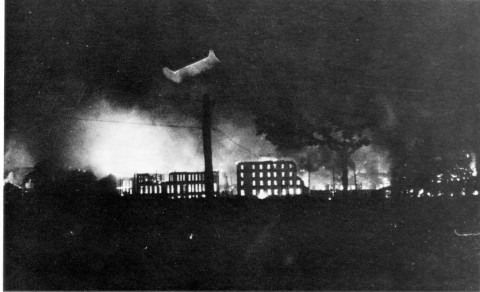[Cross-posted at Revise and Dissent.]
News of the bombing of Guernica outraged opinion in Britain, as elsewhere in the world. Or so the simple version of the story goes — the truth seems to be a little more complicated than that.
A leading article in The Times, on the same page as George Steer’s account of the raid, called it ‘a tragic story’,1 noting that there was practically no resistance from the town and next to no legitimate military objectives.
The planning of the attack was murderously logical and efficient. Its aim was unquestionably to terrorize the Basque Government into surrender by showing them what Bilbao may soon expect. Yet, so far from having that effect, it may even defeat its object. It may merely inspire the proud democrats of Vizcaya with a passionate determination to fight to the end, and it may well shock the patriotism of the other half of the Basque nation which is fighting on the insurgent side.2
But that’s about all — after discussing the importance of Guernica in Basque culture, the leader then goes on to discuss the military situation in northern Spain. It doesn’t dwell particularly on whether the raid was legitimate or not, and it seems to me that the tone is less condemnatory than that of its correspondent, Steer.3 This might be because The Times, a politically conservative newspaper, was not entirely unsympathetic to Franco’s Nationalists. Indeed, since The Times supported appeasement it was concerned not to upset the Germans: a week after Guernica its editor, Geoffrey Dawson, boasted that he ‘had done the impossible night after night to keep the paper from hurting their susceptibilities’.4 However, the Manchester Guardian, well to the left of The Times, was also slow to anger. It too published an account of the bombardment on 28 April, the same day as The Times. But it did not mention it in an editorial until two days later, where readers were enjoined not to let ‘the peculiar horror and ruthlessness of the recent raid on Guernica’5 blind them to the senselessness of the artillery bombardment of Madrid which had been going on for the last three weeks. Again, politics may be at play here: the Basques were not fighting (and dying) to defend socialism in Spain, but their own autonomy. The suffering of the Madrilenos, living as they did in the capital of the Republic, could more plausibly be understood as part of a straightforward left-right struggle.
The Spectator, a weekly magazine which occupied a broadly similar political position to The Times, was more forthright in its condemnation of the bombing than either the Manchester Guardian or The Times. Indeed, unlike those two newspapers, the Spectator’s leading article did not attempt to keep a wider view of the war but immediately declared that
Everything that has happened in Spain in the last week […] is overshadowed by the barbaric horror of the bombing of the old Basque capital, Guernica, by General Franco’s aeroplanes. Never in modern history has Europe known anything comparable.6
After describing the carnage, and Guernica as having ceased to exist, the Spectator concluded:
The Spanish civil war, unexampled in the brutal fury exhibited, has produced incidents bestial beyond belief, notably the bombing of the refugees from Malaga in January, but the sickening butchery at Guernica has no parallel. It takes rank among crimes which their very hideousness prints indelibly on history.7
Now that’s outrage.
A debate over who actually was responsible muddied the waters. According to Steer, German-made aircraft carried out the attack; a Press Association correspondent reported picking up an unexploded incendiary bomb ‘liberally stamped with German eagles’.8 And the Basque president publicly accused German airmen serving with Franco. Not surprisingly, neither Germany nor the Nationalists admitted having anything to do with it: in fact, they claimed that Republican forces had themselves burned the town, presumably as a scorched earth tactic to deny it to the advancing enemy. Republican spokesmen spokesmen even claimed that Guernica was a legitimate target for bombing, as it was producing arms for Basque soldiers, so bombing it would have been justified — but they still didn’t do it!9 None of the periodicals I’ve looked at bought this line of argument (some Catholic and/or right-wing ones did, such as the Tablet), but after the fall of Guernica, another correspondent for The Times visited the town with Nationalist engineers, and although he confirmed that it had been largely destroyed, nonetheless came away extremely sceptical of the bombardment claim:
In Guernica, on the other hand [i.e., unlike Durango, bombed on 31 March 1937], few fragments of bombs have been recovered, the façades of buildings still standing are unmarked, and the few craters I inspected were larger than anything hitherto made by a bomb in Spain. From their positions it is a fair inference that these craters were caused by exploding mines which were unscientifically laid to cut roads […] In view of these circumstances it is difficult to believe that Guernica was the target of a bombardment of exceptional intensity or was selected by the Nationalists for an experiment with incendiary bombs, as is alleged by the Basques.10
Since this journalist was none other than Kim Philby, a Soviet agent posing as a hardline conservative, one must suspect that he exaggerated the plausibility of the Nationalist version of events!
The letters columns showed that the readers of The Times generally accepted that Nationalist forces were responsible, but were split on the question of legitimacy; while those of the Manchester Guardian took it for granted that the raid was illegitimate and carried out by the Nationalists; but were more interested in asking if Britain’s own bomber force was intended to be used in the same way? Very few seemed to wonder if Guernica’s held portents for Britain itself. This surprised me: I had assumed that, as Robert Wohl puts it, Guernica ‘reminded the British of their own vulnerability to aerial attack’11 and so expected to find more responses like this one, by Lord Davies:
We are indebted to your Correspondent for his article describing the fate of Guernica. Now we know beyond peradventure what to expect when the squadrons of the air are let loose to work their havoc upon the capitals of Europe.
How is this catastrophe to be prevented? Is it not possible, before it is too late, to mobilize the air forces of every country in Europe which is prepared to submit itself to the rule of law and constitute them into an International Police Force, whose superiority in numbers and equipment, no less its moral solidarity and cohesion, holds out the only hope of deterring any nation from resorting to war?
The blood of the defenceless victims of Guernica cries aloud not for vengeance, but for the deliverance of mankind from the hideous menace of the air.12
But Davies was, to be honest, a bit of a bore on his favourite subject of an international air force; and few others seemed to make an explicit connection between the near future of London and the recent past of Guernica (or of Madrid, for that matter, heavily bombed the previous November). I don’t doubt that such connections were made, but in the short term, at least, it seems that they were eclipsed by outrage at the barbarism on display at Guernica.13
But why did Guernica happen at all? I’ll discuss that in the last post in this series.
![]() This work is licensed under a Creative Commons Attribution-NonCommercial-NoDerivatives 4.0 International License.
Permissions beyond the scope of this license may be available at http://airminded.org/copyright/.
This work is licensed under a Creative Commons Attribution-NonCommercial-NoDerivatives 4.0 International License.
Permissions beyond the scope of this license may be available at http://airminded.org/copyright/.
- The Times, 28 April 1937, p. 17. [↩]
- Ibid. [↩]
- Having said that, I notice that Ian Patterson in his new book on Guernica describes The Times’s editorial as ‘powerful’. But he’s evidently looked at a broader cross-section of press opinion than I have, and when compared with the denialist responses of the pro-Franco periodicals like the Tablet, it probably does seem powerful. Ian Patterson, Guernica and Total War (London: Profile Books, 2007), 31. [↩]
- Quoted in Antony Beevor, The Battle for Spain: The Spanish Civil War 1936-1939 (London: Weidenfeld and Nicolson, 2006), 245. [↩]
- Manchester Guardian, 30 April 1937, p. 10. [↩]
- Spectator, 30 April 1937, 785. The Spectator had two kinds of leading articles: short, very topical ones in a section called “News of the week”; and longer, sometimes less topical ones. This was one of the former. [↩]
- Ibid. [↩]
- Manchester Guardian, 28 April 1937, p. 11. [↩]
- Which brings to mind those cranks who argue that the Holocaust never happened — but the Jews deserved it anyway … [↩]
- The Times, 5 May 1937, p. 16. [↩]
- Robert Wohl, The Spectacle of Flight: Aviation and the Western Imagination, 1920-1950 (Carlton: Melbourne University Press, 2005), 221. [↩]
- The Times, 29 April 1937, p. 12. [↩]
- Certainly it could be argued that this was the partly the point of emphasising the barbarous nature of bombing Spanish civilians, so that British ones might escape the same fate, and that’s probably true. It’s just that I don’t see much direct evidence for that. [↩]





Pingback: Airminded · Guernica — III